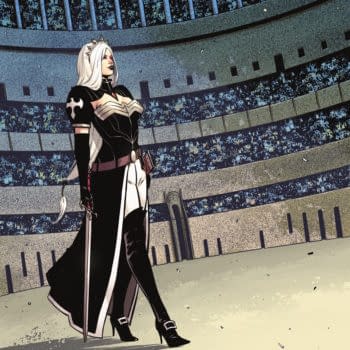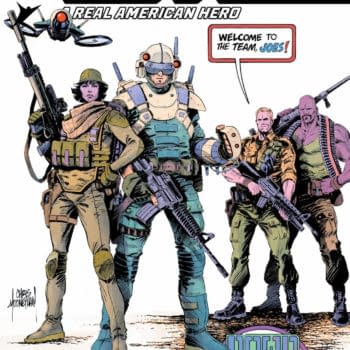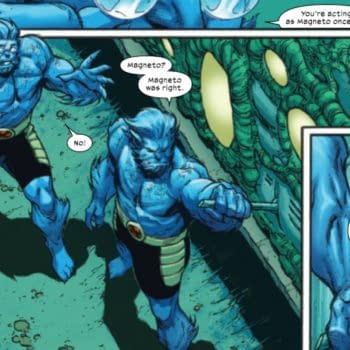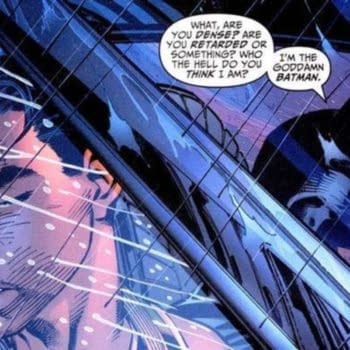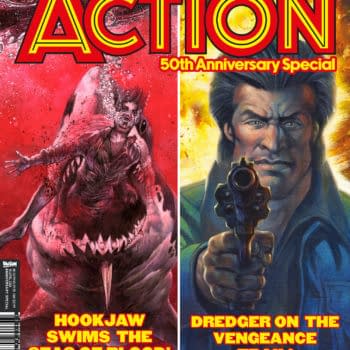Posted in: Comics, Look! It Moves! by Adi Tantimedh, Run Around | Tagged: adi tantimedh, detective dee, film
Look! It Moves! by Adi Tantimedh #81: When Tsui Hark Awakes

Yes, it was great fun, a martial arts and CGI blockbuster that shows Tsui Hark doing what he does best: epic storytelling and massive, elaborate action sequences with charged political allusions throughout.
Set in the Tang Dynasty on the eve of the coronation of Empress Wu Zetian, the murder mystery kicks off with a pair of palace officials spontaneously bursting into flames and burning to ashes while inspecting the 1,000-foot statue of Buddha being build for commemorate Wu's ascent to the throne. Since the officials had disturbed scriptures in the Buddha before they died, Wu's opponents start to spread rumours that the gods disapprove of her coronation. Faced with conspirators from all sides, Wu suspects the deaths are part of a larger plot to depose her, and orders the best detective the imperial court ever saw to solve the case and bring the conspirators to bear. But first, she has to pardon him from the prison she sentenced him to eight years ago for opposing her taking the throne as regent when the emperor died. Inspector Di Renjie, or Detective Dee, thus has to watch his back from the court officials, the other detectives assigned to assist him and a whole army of assassins out to stop him.
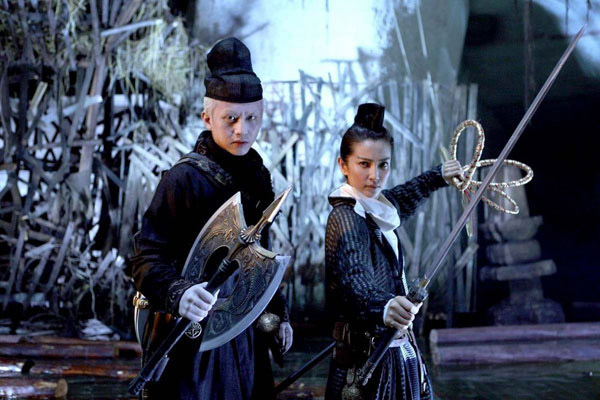
Back in the mid-80s, the world got hip to Hong Kong action movies and Tsui Hark and John Woo were considered the best action directors in the world. When he broke through in the West with A CHINESE GHOST STORY, movie lovers eagerly wait for every new movie that Tsui Hark produced or directed. He was practically a one-man movie industry, employing virtually every Hong Kong genre director of note. He produced the movies that put John Woo on the map, A BETTER TOMORROW and THE KILLER and also launched the Heroic Bloodshed shootout movie trend that Hollywood has been ripping off ever since. He singlehandedly revived interest in Wuxia movies by using Hollywood special effects experts on ZU: WARRIORS OF THE MAGIC MOUNTAIN, and then kicked the trend even further with first A CHINESE GHOST STORY and then the ONCE UPON A TIME IN CHINA series which made Jet Li. PEKING OPERA BLUES was unique for a lot of reasons, including its featuring three female leads in a historical political action comedy-thriller. He made Brigitte Lin a star in SWORDSMAN 2 by casting her as a transsexual sorcerer who castrates himself to become a woman and attain mystic powers, only to fall in love with Jet Li in one of the most surreal and subversive doomed love stories in Cinema.
[youtube]http://www.youtube.com/watch?v=T48csKaG3OY[/youtube]
Tsui Hark's movies were subversive, hyper-manic and politically-charged. They were pop entertainment that sued codes and symbols to allude to and explore the anxiety of the impending handover of Hong Kong back to Mainland China in 1997. The plots of the gangster, cop and wuxia movies coming out of Hong Kong from the 1980s up to 1997 were suffused with the nervous energy of a population uncertain about the future, and this came out in stories about doomed gangsters threatened by rivals and the Law, wandering swordsmen wary of authority, their enforcers and the would-be leaders that sought to take power.
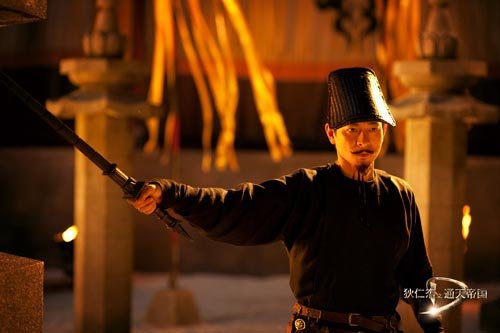
The Hong Kong film industry burned itself out by 2000 from repeating too many genre formulae and not trying any new ideas. Without the charge of the '97 Handover fuelling the stories and with life in Hong Kong largely unchanged since, filmmakers have been hard-pressed to find something to say collectively in genre other than ambiguous cop-and-informer morality tales like INFERNAL AFFAIRS and FIRES OF CONSCIENCE. Individual filmmakers like Pang Ho-Cheung have emerged with a sophisticated sense of storytelling and social commentary and satire, but overall, the industry has been in the doldrums.
Time and Tide:
http://www.c2itmedia.com/time-tide.jpg
The truth is, Tsui Hark never really went away. It's just that Western critics stopped paying attention when Hong Kong movies ran out of ideas and the Hollywood studios stopped bothering to pick up Hong Kong movies for distribution once the shine on the Hong Kong action movie trend died off and John Woo had been subsumed into Hollywood. Tsui Hark has continued to try out new ideas or revamp older ones since 2000, with TIME AND TIDE, the last film of his that people considered any good a reaction to John Woo's movies and an examination on the post-1997 sense of apprehension and aimlessness with a 20something slacker hero who accidentally gets a lesbian cop pregnant from a one-night stand and decides to provide for her and the baby by taking a job as a bodyguard despite his utter cluelessness and the only things he knows were learned from action movies, then befriending a former mercenary who's the real deal as they face off against real bad guys who brought enough firepower to bring down a city block. And the hero never even gets to fire a real gun through the whole movie. LEGEND OF ZU, an attempt to revamp the mystical FX-laden wuxia movie again was drowned by too much CGI, even though the images were mind-blowingly mad, but the story was too empty. SEVEN SWORDS was reasonably successful in Asia, but its story was too derivative of THE SEVEN SAMURAI and it felt old, despite some spectacular setpieces. MISSING was a contemporary supernatural mystery with a messy, overly-complicated script.

Tsui Hark's restless filmmaking skills were never in doubt, and what he always needed were a solid script and new ideas. His last movie, ALL ABOUT WOMEN, was the first real Mainland Chinese screwball comedy featuring three women in modern China who couldn't have existed in the communist era, a millionaires tycoon, a nerdy biochemist and a punk rocker, dealing with modern romance entirely on their terms and able to function perfectly well without having to depend on a man. It was also an interesting look at the effects of feminism on modern Chinese women that doesn't seek to punish them for their independence.
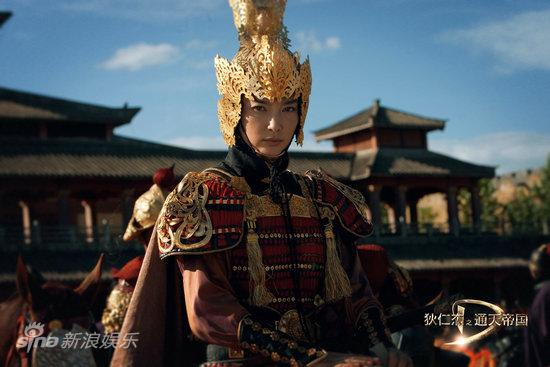
DETECTIVE DEE AND THE MYSTERY OF THE PHANTOM FLAME is the first wuxia movie where Tsui Hark finally found a solid script that has ideas that haven't been done before: a postmodern blockbuster that reimagines a famous character from history and fiction the same way Guy Ritchie reconfigured SHERLOCK HOLMES. There really was an Empress Wu, who was the first female emperor in history, Di Renjie was a real chancellor during her reign and was reimagined into the fictional JUDGE DEE by sinologist Robert van Gulik's novels, and even Dee's potential love interest and imperial bodyguard Chancellor Jing'er was based on a real poet, writer and politician who served under Empress Wu (but didn't know martial arts). Empress Wu has always been a divisive figure to historians, being smart, cunning, Machiavellian and ruthless in her ascent to the throne, and her detractors always showed a hint of misogyny, which is mentioned in Tsui Hark's movie as he plays with his recurring themes of misogyny and strong women who hold their own in a male-dominated society. In fact, the whole movie is politically interesting: a script by Taiwanese filmmaker Chen Kuo-Fu, directed by a Hong Kong filmmaker, and there's an ambiguous rehabilitation of the reputation of Empress Wu and a not-so-veiled allegory for compromise and perhaps reconciliation between the Mainland and Taiwan, with Empress Wu as China and Detective Dee as Taiwan, especially with Taiwanese Andy Lau in the role. There's also a curious assertion of patriarchal wisdom when Dee advises the empress to rule ethically and return the succession of the throne to her son when she steps down.
There's a symbolic charge in the dangerous and powerful Empress Wu holding Dee's life in her hands, Mother China deigning to let upstart son Taiwan have his freedom to help her, but ready to exterminate him if he shows signs of plotting against her. That Dee, who rebelled against her previously, comes to accept her authority because the alternative would be civil war with millions dead is also an unmistakable political message the movie seems to portray with some ambivalent, and which can only come from a scriptwriter and director who aren't native Mainland Chinese. The fact that the movie was approved by the Chinese authorities for production and release in China is also very interesting.
But you're not interested in all that political stuff. You just want to know if the movie kicks ass and has cool action in it. It does. It has all the romance and stunts and setpieces you could hope for, and the wire-fu is mostly naturalistic, the slightly dodgy CGI is forgivable because you actually care about what happens to the characters. You should see it on a big screen if you can.
I just wish they'd get someone competent to write the English subtitles…
DETECTIVE DEE AND THE MYSTERY OF THE PHANTOM FLAME has not been picked up for distribution in the West so far, but you can find the DVD and Blu-ray from your local Chinatown shop or places like yesasia.com
Staying away from wires at lookitmoves@gmail.com
I've begun the official LOOK! IT MOVES! twitter feed. Follow me at http://twitter.com/lookitmoves for thoughts and snark on media and pop culture, stuff for future columns and stuff I may never spend a whole column writing about.
Look! It Moves! © Adisakdi Tantimedh







